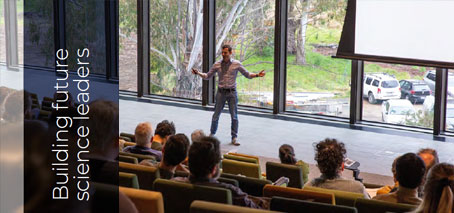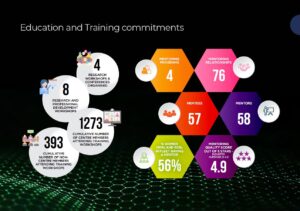
This is an extract from the 2022 FLEET annual report [read the full report online] See previous section (Communication)
FLEET is working to develop Australia’s next generation of science leaders.
All FLEET’s students and young researchers receive excellent supervision, are offered world-class training and other opportunities for professional development, and are supported in navigating diverse future career pathways.
The Centre currently supports 63 higher degree by research (HDR) students and 52 postdoctoral researchers.
PhD students are given the opportunity to have an associate supervisor from one of the other FLEET nodes, which helps with cross pollination of ideas and development of collaborative projects.
FLEET training in 2022 featured an increased focus on research translation, including seminars on intellectual property and translation by FLEET Translation Program Manager Michael Harvey, and expanded ‘translation ecosystem’ content in the EQUS–FLEET Idea Factory.
The ongoing FLEET research seminar series (see Collaboration) was tweaked in 2022 towards presenting ECR research, thereby developing members’ skills and confidence in presenting to a public group.
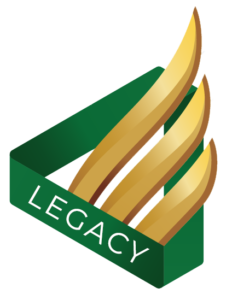 FLEET will:
FLEET will:
- Develop Australia’s next generation of science leaders
- Train researchers in the electronics of tomorrow.
STRATEGIC PRIORITIES
- Develop world-class training and mentoring programs
- Establish Centre succession planning (see FLEET.org.au/strategic-plan p25)
- Facilitate opportunities for research collaboration
- Establish a collaborative culture within the Centre
- Facilitate opportunities for career development in industry
- Identify opportunities for members to be recognised.
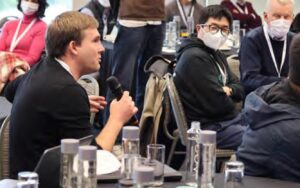 In addition FLEET members logged over 800 hours of science outreach, which has been confirmed to be valuable training for communicating science concepts to a wider audience.
In addition FLEET members logged over 800 hours of science outreach, which has been confirmed to be valuable training for communicating science concepts to a wider audience.
FLEET members took the initiative to pursue their own external training on equity issues (a requirement for all Centre members), for example, learning about Aboriginal/First Peoples’ cultural issues, gender and queer issues, appropriate workplace behaviour and fair interviewing practices.
In addition, members sought out external training on occupational health and safety, start-ups, career skills, supervision and leadership.
FLEET TRAINING PROGRAMS IN 2022
Training was delivered in specific fields of physics and materials science (via research seminars and colloquia) and in transferable skills such as intellectual property law and career planning, including the following:
- 8 FLEET seminars
- 4 joint seminars
- 2 research translation seminars
- 4 intellectual property seminars
- 8 US–Australia Transpacific Colloquia
- Idea Factory: 14 FLEET members
- Science Meets Parliament: 7 FLEET members
- veski Kickstart program on industry engagement (Centre meeting at Wollongong): 73 members
- InSTEM conference on equity and diversity: 17 members and alums (see case study)
- DIY communications’ training for scientists in publicising their own research (Centre ECR workshop)
- Presenting your research: creating great figures and presentations (Centre ECR workshop)
- Cruxes Innovation Base research translation program: 2 members
- Weizmann Institute quantum Hall and topology course: 3 members.
2022 HIGHLIGHTS
- Developing translation knowledge in the EQUS–FLEET Idea Factory
- Building members’ awareness of the translation ecosystem and intellectual property laws
- Introducing another seven Centre members to policymakers and policymaking via STA’s Science Meets Parliament
- Running 31 professional development training events for FLEET members and affiliates.
IN 2023 FLEET WILL
In 2023 FLEET will maintain its existing level of training and research seminars and will also:
- Develop a training workshop on responsible innovation
- Reopen ECR grants in two grant rounds per year (offering a total of $20,000 per year with up to $5000 per person)
- Begin evaluating the progress of FLEET’s education and training activities towards the strategic goal of developing the next generation of science leaders.
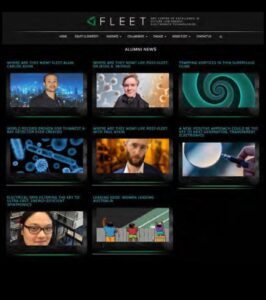 Lasting impact: FLEET alums
Lasting impact: FLEET alums
Members who have moved on to great new careers leverage skills developed at FLEET
Ultimately it will be FLEET’s alums as much as its research outputs that define the success of the Centre.
One of the most lasting and valuable legacies left by any Centre of Excellence is its people, and five years into the life of the Centre, FLEET is seeing more and more alums move on to great careers in diverse areas.
We are extremely proud of our alums, and for both personal and professional reasons, FLEET works hard to maintain contacts – sharing alums’ stories with current members and keeping alums connected via Centre communications and invitations to training and social events.
STAYING IN TOUCH
It is a testament to the sense of belonging at FLEET that almost all departing members choose to remain on the FLEET monthly newsletter list to stay in touch with the Centre.
FLEET alums updates and career highlights are included in the Centre newsletter while research blog profiles show how our alums are applying their scientific and transferable skills in different areas, helping our current PhD candidates envision more diverse future careers for themselves.
Alums under the spotlight in 2022 included:
- Charlotte Hurry Business Manager, ARC Centre
- Sam Bladwell Science editor at Nature Publishing
- Elizabeth Marcellina University of Sydney Research Fellow
- Pavel Kolesnichenko Spectroscopy postdoc, Heidelberg University Germany
- Shilpa Sanwlani Senior Data Analyst Financial sector crime detection
- Jesse Vaitkus German commercial quantum software company
- Carlos Kuhn Government and defence policy and consultancy.
More at FLEET.org.au/alumni
MENTORING PROGRAM
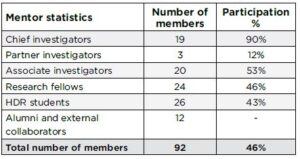
FLEET provides mentoring to personnel across all career stages (such as PhD students and early- and mid-career researchers) covering areas such as induction, career advancement and planning, equity and diversity, professional development, entrepreneurship and research leadership skills.
Three main mentoring mode are available to FLEET members within the Centre:
- Participation in FLEET governance committees
- Group mentoring via training sessions, for example, on manuscript preparation, grant writing, scientific presentation and research leadership
- Individual, goal-oriented mentoring, where members are individually matched to a mentor within FLEET (or in some cases outside FLEET) based on their needs, for example, guiding applications for
promotion, grant writing or providing career advice.
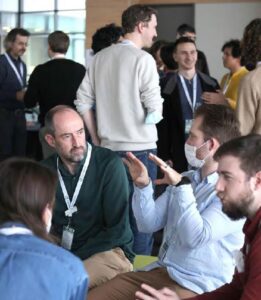 There are now 87 participants and 76 active mentorship pairs (close to doubling since 2021). In addition, some FLEET members are also involved in other mentoring programs such as IMNIS and those facilitated by their local universities.
There are now 87 participants and 76 active mentorship pairs (close to doubling since 2021). In addition, some FLEET members are also involved in other mentoring programs such as IMNIS and those facilitated by their local universities.
In 2022, the focus of the FLEET mentoring program was to improve participation of investigators and postdocs internally, as well as tapping into the Centre’s alumni network and engaging external collaborators.
Currently, 43% of HDR students, 46% of research fellows, 53% of associate investigators and 90% of chief investigators are participating as either mentors or mentees (or both) in the FLEET mentoring program. Almost 60% of women in FLEET have mentors.
Four tailored, individual mentoring programs are available:
- For early-career researchers exploring career options
- In industry, for researchers considering work outside academia
- In academia, for researchers looking at building their academic careers
- For Women in FLEET, focusing on challenges unique to women in STEM.
FLEET’s expanded mentor network includes international partners, industry representatives and alums with diverse career experiences, including from industry and research collaborators.
The commercial mentoring-management platform Mentorloop provides capacity to match mentors to mentees, and its evaluation tools measure the effectiveness of the Centre mentoring program. The platform also delivers training resources for both mentors and mentees to enhance engagement; this was added in response to member feedback.
FLEET has developed its own survey to understand the impact of the FLEET mentor program. The survey will be sent out early 2023 and again in 2024.
We are currently planning a cross-CoE mentoring program to be implemented in 2023.

